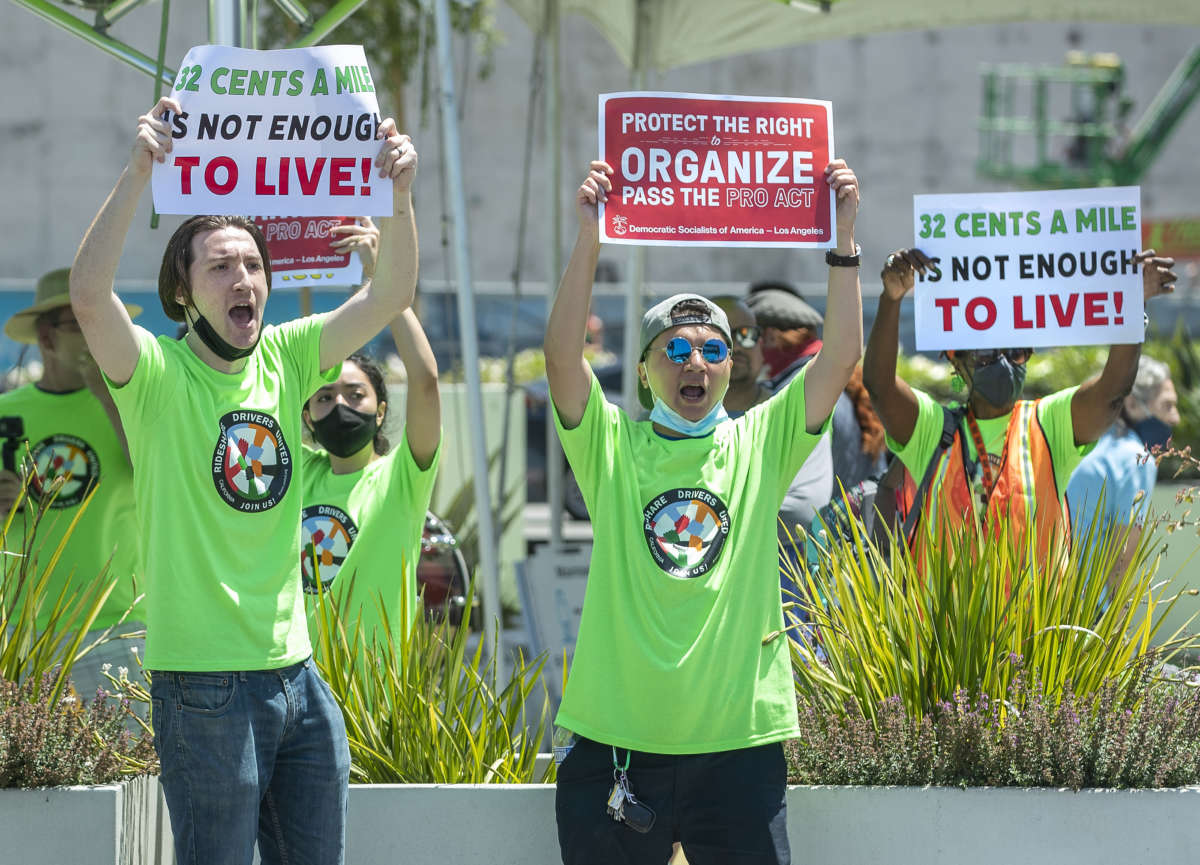Support justice-driven, accurate and transparent news — make a quick donation to Truthout today!
A California judge ruled Friday that Proposition 22 — a measure that let so-called gig economy companies like Uber and Lyft limit worker protections — is unconstitutional.
“This is a MAJOR and deserved win for drivers and gig workers,” the California Labor Federation tweeted Friday in response to the ruling.
Passed last November after over $200 million in campaign spending by major gig companies, Prop 22 let the companies classify workers as independent contractors rather than employees.
Morgan Harper, senior advisor at the American Economic Liberties Project, previously called Prop 22 “not just the most expensive ballot initiative of all time” but “an egregious display of the ways dominant corporations use ill-won profits to entrench their power, shape public discourse, influence government policy, and avoid accountability.”
The Service Employees International Union (SEIU) and drivers filed suit, with a February challenge at the Alameda County Superior Court after the California Supreme Court declined to hear their petition. The workers alleged in part that the measure denied the state Legislature the ability to grant workers the right to organize for better working conditions.
We’re proud to stand with Gig Drivers in the fight against #Prop22, which aimed to unconstitutionally deny gig drivers their fundamental rights. We’re proud to support drivers in their fight for basic rights and for the integrity of our democracy. pic.twitter.com/gS86halQpH
— SEIU California (@seiucalifornia) August 21, 2021
Siding with the workers, Alameda County Superior Court Judge Frank Roesch said Friday that Prop 22 was “unenforceable,” citing in part the law’s “difficult to the point of near impossibility” requirement of the support of seven-eighths of the state Legislature to make any changes.
“A prohibition on legislation authorizing collective bargaining by app-based drivers does not promote the right to work as an independent contractor, nor does it protect work flexibility, nor does it provide minimum workplace safety and pay standards for those workers,” Roesch wrote. “It appears only to protect the economic interest of the network companies in having a divided, ununionized workforce, which is not a stated goal of the legislation.”
Bob Schoonover, president of the SEIU California State Council, welcomed the development, saying Friday the “ruling by Judge Roesch striking down Proposition 22 couldn’t be clearer: The gig industry-funded ballot initiative was unconstitutional and is therefore unenforceable.”
“Companies like Uber and Lyft spent $225 million in an effort to take away rights from workers in a way that violates California’s constitution,” he said, accusing the companies of having “tried to boost their profits by undermining democracy and the state constitution.”
Veena Dubal, a professor at the University of California Hastings Law School who filed a court brief in support of the workers, previously said Prop 22’s passage amounted to “the most radical undoing of labor legislation since Taft-Hartley in 1947.”
In a tweet hours after Roesch’s ruling, she pointed to a still-long road ahead for worker rights.
“We won tonight, but make no mistake,” Dubal wrote. “Victory is never handed by legal edict to working people. To the contrary, our collective struggles are just beginning. May the platform plantation owners lose sleep as we build solidarity and power for equality and justice.”
The coalition representing the gig economies, meanwhile, has announced its intention to appeal.
Trump is silencing political dissent. We appeal for your support.
Progressive nonprofits are the latest target caught in Trump’s crosshairs. With the aim of eliminating political opposition, Trump and his sycophants are working to curb government funding, constrain private foundations, and even cut tax-exempt status from organizations he dislikes.
We’re concerned, because Truthout is not immune to such bad-faith attacks.
We can only resist Trump’s attacks by cultivating a strong base of support. The right-wing mediasphere is funded comfortably by billionaire owners and venture capitalist philanthropists. At Truthout, we have you.
Our fundraising campaign is over, but we fell a bit short and still need your help. Please take a meaningful action in the fight against authoritarianism: make a one-time or monthly donation to Truthout. If you have the means, please dig deep.
